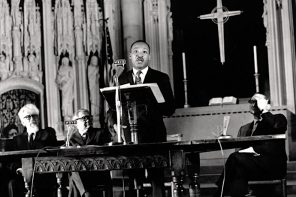Herman Cain broke into song at the National Press Club on Halloween, with a short rendition of Dottie Rambo’s “He Looked Beyond My Faults and Saw My Needs.” The song was the capstone of a busy day of “tap dancing” for Cain, who spent most of the day claiming his innocence in a sexual harassment suit bought by two former female employees of the National Restaurant Association. The suit, filed while Cain was CEO of the organization, accused him of “inappropriate and sexually suggestive behavior” according to Politico. Both women signed agreements with the organization at the time, accepted a financial settlement, and left.
Cain’s singing, however, is indicative of his inability to find the right note—one that will make him an acceptable candidate for the moderate wing of the Republican Party, and Karl Rove. Cain’s political minstrel show may come to a rapid end, though, if these accusations pan out against him.
The candidate’s denial of the account reeks of the string of denials, missteps, and instances of foot-in-mouth disease that have catapulted him to the top of the Republican Primary polling. By playing off the rising tide of questions with his stock phrases of “That is incorrect,” “I didn’t know” about a payoff, and then—less than three hours later on a taped segment—saying that he knew of a cash settlement, makes Cain someone who has, at the very least, a bad memory, but who is, at worst, a serial liar.
The worst part of Cain’s pandering is that he used the National Press Club event to try to insert his faith as a buffer into the conversation.
Cain, a member of Antioch Baptist church North in Atlanta, Ga, has mentioned his Christian faith on the campaign trail, and has recorded a gospel album. Cain’s singing of “He looked beyond my faults” was, in my opinion, a combination of minstrel show, an Amos and Andy riff without Amos, and a sly admission. By going into entertainment mode with the crowd, Cain tried to both deftly testify to his faith with his Teavangelical base, while at the same time throwing the throngs of reporters off from the trail of the sexual harassment suit. All while confessing that while “others saw his faults, He (Jesus) saw my need.” One wonders what Cain’s faults really are.
I’ve hesitated to write about #TheHermanCain in part because he honestly irks me. I understand conservative Republican African Americans, but Herman Cain panders to the worst of racial fantasies about the black man who loves whites more than his own life. Cain’s statement at the National Press club—“This many white people can’t pretend they like me”— smacks of buffoonery. A Morehouse man who did not participate in any Civil Rights events during his time at the school in Atlanta in the early 1960s, Cain also blames African Americans for being “brainwashed” by the Democratic party into not being open minded and considering a conservative point of view. Cain also believes the “Planned Parenthood promotes black genocide” line from Maafa 21. Others may disagree, but Cain’s arrogant dismissal of anyone who disagrees with him, and his racialized posturing, may be intented to convince his audience that he has transcended race. On the contrary.
Cain’s singing, his effusive happiness that “whites” love him, and his constant so-called joking all remind me of a statue that was placed in Louisiana in 1927 called the “Uncle Jack, the Good Darky.” Designed to honor faithful slaves that kept the plantations while their masters went off to war, the statue has a plaque that says “Erected by the city of Natchitoches in grateful recognition of the arduous and faithful services of the good darkies of Louisiana.” The statue aggravated many blacks, but wasn’t put away into storage until the Civil Rights Movement.
The statue, like Cain’s performance and willingness to pander by singing and joking make him seem like a racial throwback with an Ayn Rand core. Unlike the rest of the Republican field, Cain’s behavior, whether he likes it or not, is read through a racial lens, even when he proclaims how many white people like him. By willfully performing ‘race” Cain’s so called “confidence” erodes his viability as a real candidate. Cain’s show may take him to the nomination if he can manage to bring his ragtag campaign together. But for this brainwashed African American professor, Cain’s exit from my television set with his 2012, 21st century minstrel show can not come soon enough.
If I wanted Uncle Ruckus to run for president, I’d watch The Boondocks.




